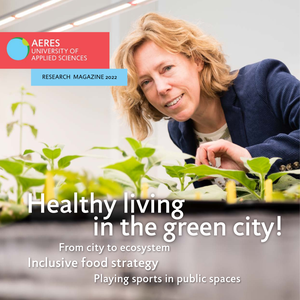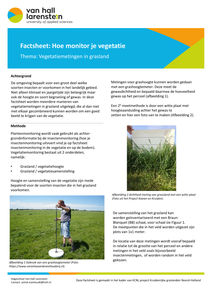Om de onderzoeksvraag “Waar kan Rijkswaterstaat verantwoord doorgroeibare verhardingen toepassen op verzorgingsplaatsen?” te beantwoorden zijn de volgende methoden gebruikt: literatuuronderzoek, interviews met RWS-medewerkers, inventarisatie van voorbeelden uit praktijk met behulp van ClimateScan.nl.
LINK
''There is a clear demand for a collaborative knowledge-sharing on climate adaptation and mitigation. As a consequence of urban expansion, green spaces are lost and the available areas for pervious green areas are decreasing. Many cities will experience greater impacts from flooding and heatstress due to climate change. Blue-green and small scale Nature-based solutions (NBS) such as bio swales, raingardens and wetlands offer opportunities to adapt urban areas to the impacts of climate change, but their multiple benefits are often unknown to the wider public. Research suggests that effective management of mitigate flood events and heat stress will be achieved by applying a range of NBS measures at different locations in cities [Majidi et al 2019]. Mapping of these (potential) locations for NBS will raise awareness and contribute to capacity building on climate adaptation. Some open source Climate Change Adaptation Platforms (CCAPs) allow mapping of NBS by citizen science and can help to inform and inspire different stakeholders on the topic of climate adaptation in respective region. The aim of most CCAPs is to facilitate an open and free exchange of knowledge on an international scale. Raising awareness about climate adaptation in urban areas and promoting NBS are also key aims.''
DOCUMENT
With the beautiful new building of Aeres University of Applied Sciences Almere in the Floriade park, we have materialized our wish to lead the way in the green transition and its challenges. We want to be green changemakers and have the ambition to take on the challenges that we are faced with in agriculture, food and healthy living environments. We bring this about with our study programmes and increasingly with our Practice-Based Research Team. In 10 years’ time, this team has grown from our first professorship into a mature team of 20 people, of whom 7 are research professors.In this edition, three of our new professors will be introduced to you.
DOCUMENT

Citizen participation in local renewable energy projects is often promoted as many suppose it to be a panacea for the difficulties that are involved in the energy transition process. Quite evidently, it is not; there is a wide variety of visions, ideologies and interests related to an ‘energy transition’. Such a variety is actually a precondition for a stakeholder participation process, as stakeholder participation only makes sense if there is ‘something at stake’. Conflicting viewpoints, interests and debates are the essence of participation. The success of stakeholder participation implies that these differences are acknowledged, and discussed, and that this has created mutual understanding among stakeholders. It does not necessarily create ‘acceptance’. Renewable energy projects often give rise to local conflict. The successful implementation of local renewable energy systems depends on the support of the local social fabric. While at one hand decisions to construct wind turbines in specific regions trigger local resistance, the opposite also occurs! Solar parks sometimes create a similar variation: Various communities try to prevent the construction of solar parks in their vicinity, while other communities proudly present their parks. Altogether, local renewable energy initiatives create a rather chaotic picture, if regarded from the perspective of government planning. However, if we regard the successes, it appears the top down initiatives are most successful in areas with a weak social fabric, like industrial areas, or rather recently reclaimed land. Deeply rooted communities, virtually only have successful renewable energy projects that are more or less bottom up initiatives. This paper will first sketch why participation is important, and present a categorisation of processes and procedures that could be applied. It also sketches a number of myths and paradoxes that might occur in participation processes. ‘Compensating’ individuals and/or communities to accept wind turbines or solar parks is not sufficient to gain ‘acceptance’. A basic feature of many debates on local renewable energy projects is about ‘fairness’. The implication is that decision-making is neither on pros and cons of various renewable energy technologies as such, nor on what citizens are obliged to accept, but on a fair distribution of costs and benefits. Such discussions on fairness cannot be short cut by referring to legal rules, scientific evidence, or to standard financial compensations. History plays a role as old feelings of being disadvantaged, both at individual and at group level, might re-emerge in such debates. The paper will provide an overview of various local controversies on renewable energy initiatives in the Netherlands. It will argue that an open citizen participation process can be organized to work towards fair decisions, and that citizens should not be addressed as greedy subjects, trying to optimise their own private interests, but as responsible persons.
DOCUMENT

In opdracht van de Dienst Stedelijke Ontwikkeling en Beheer gemaakte sociale analyse van de wijk Lakerlopen in Eindhoven in het kader van de integrale wijkvernieuwing. Lakerlopen is statistisch gezien een van de 'slechtse'wijken van Eindhoven. Dit onderzoek heeft als insteek de sociale relaties tussen bewoners onderzocht. In de wijk worden bijna 30 leefgebieden onderscheiden. Leefgebieden zijn die pleintjes, straten, flats e.d. wat bewoners tot hun directe woonomgeving rekenen, en waarbij zij zich erg betrokken voelen. Dit onderzoek toont aan dat het niveau van de sociale relaties in de leefgebieden voornamelijk op of boven de gestelde norm zit. Voor vele betrokkenen, van actieve bewoner tot stedebouwkundige, was dit een verrassende uitkomst; het zorgde voor nieuw elan in de wijkvernieuwing, en een andere kijk op aandachtswijken in Eindhoven.
DOCUMENT

Met onderzoekspartners Ruben Vrijhoef (HU), Erlijn Eweg (HU), Raymond Stijkel (BAM), Arnold Homan (Inbo), Bas Slager (Repurpose). Uit de Inleiding: "In september 2015 heeft Hogeschool Utrecht een project aanvraag ingediend bij NRPO SIA, genaamd Circulaire gebouw installaties, samen met de partners BAM, Inbo en Repurpose. De insteek van het onderzoek was dat de gebouwinstallaties van het onderwijsgebouw aan de Padualaan 99 en 101 onderzocht werden op de mogelijkheid voor circulair hergebruik, met de partner bij de grootschalige renovatie van deze twee HU gebouwen. Op 23 februari ontvingen we de toekenning van NRPO SIA. Het oorspronkelijke project was gepland om eind oktober, begin november 2015 te starten. Door de toekenning later dan wij verwacht hadden, moesten we echter opnieuw met de projectpartners in overleg. In het project was uitgegaan van een bepaald onderzoeksobject, een gebouw. Het in het projectvoorstel omschreven onderzoeksobject was inmiddels al gestript en gesloopt (januari 2016). Daardoor is er in onderling overleg, besloten tot de volgende inhoudelijke projectwijzigingen: 1) De keuze voor een ander onderzoeksobject. 2) Het uitgangspunt wordt omgebogen naar de toepassing van multifunctionele bouwdelen, waarin de installaties al verwerkt zijn. De in het oorspronkelijke projectplan genoemde resultaten blijven in hoofdlijnen ongewijzigd, maar de resultaten op detailniveau worden iets anders ingevuld en uitgewerkt. De aanloop van dit project laat direct één van de kritische succes factoren zien bij een circulaire economie in de praktijk. En dat is de afstemming van vraag en aanbod van bouwmaterialen en producten binnen de keten. Als we materialen uit sloop en renovatiepanden elders willen hergebruiken en de timing van sloop of bouw wordt vertraagd, hapert het proces. Bij dit KIEM-VANG project ging het precies andersom: de sloop/renovatie van het beoogde onderzoekspand was al gebeurd op het moment dat de aanvraag werd goedgekeurd."
MULTIFILE

Op dinsdag 28 maart organiseerde Van Hall Larenstein in samenwerking met BoerenNatuur een veldbijeenkomst over akkervogelmonitoring op het biodynamische akkerbouwbedrijf BioRomeo in Ens. Deze bijeenkomst had tot doel om kennis uit te wisselen over hoe monitoring van akkervogels aangepakt kan worden en hoe de monitoringresultaten gebruikt kunnen worden om het akkervogelbeheer te verbeteren. Hierin is o.a. aandacht besteed aan de vertaling van monitoringsresultaten naar de praktijk van het akkervogelbeheer. Zowel beleid- als beheermonitoring zijn hierbij aanbod gekomen omdat resultaten vanuit beide type monitoring elkaar versterken. De presentaties zijn gegeven door Raymond Klaassen van de Rijksuniversiteit Groningen en Kenniscentrum Akkervogels, het Flevolands Agrarisch collectief en Marjon Schultinga van Agrarisch Natuur Oost Groningen.
MULTIFILE

De omgeving bepaalt voor een groot deel welke soorten insecten er voorkomen in het landelijk gebied. Niet alleen klimaat en jaargetijde zijn belangrijk maar ook de hoogte en soort begroeiing of gewas. In deze factsheet worden meerdere manieren van vegetatiemetingen in grasland uitgelegd, die al dan niet met elkaar gecombineerd kunnen worden om een goed beeld te krijgen van de vegetatie.
DOCUMENT

In het project ‘Landbouw in Klimaatrobuuste Beeklandschappen’ (SIA PVG.DZ21.03.004) zijn het bodem- en watersysteem, het agrarisch perspectief, de verdienmogelijkheden binnen dit landschap en de rol van governance uitgewerkt. De methodieken zijn aan de hand van drie verschillende casusgebieden opgesteld, getest en repliceerbaar gemaakt en hebben verschillende producten en rapportages opgeleverd. De gebruikte casusgebieden zijn het Koningsdiep (FR), de Buulder Aa (NB) en het Vechtdal (OV), drie verschillende maar wel vergelijkbare gebieden op zandgronden waar de aanwezigheid van lokale laagtes en hoogtes voor complexe dynamiek zorgen op het gebied van droogte en wateroverlast. Dit deelbestand is onderdeel van het grotere geheel. Houd er rekening mee dat deze informatie is gepubliceerd op 28-02-2025 en onderhevig kan zijn aan wijzigingen.
DOCUMENT

BrabantAdvies roept op om het leegstandsvraagstuk te koppelen aan de verduurzaming van de gebouwenvoorraad. Met de energietransitie staan overheden voor de opgave om op grote voet te verduurzamen en energie te besparen. Door de voorraad aan leegstaande gebouwen grondig langs te lopen, kan een afweging gemaakt worden welke panden zich lenen voor de verduurzaming. Daarbij zal ook dienen te worden afgewogen bij welke panden verduurzaming een overbodige ingreep is, aangezien ze geen toekomstperspectief hebben en voor sloop in aanmerking komen. Om dat mogelijk te maken zijn nieuwe instrumenten nodig. BrabantAdvies richt zich met haar boodschap niet enkel tot de provincie, maar juist ook tot gemeenten. Het onderstreept de uitgangspunten van de provinciale aanpak: het herbestemmen en transformeren van panden geldt als het ‘nieuwe bouwen’ en eigenaren en gemeenten zijn als eerste aan zet om de leegstand aan te pakken.
MULTIFILE